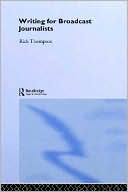

 |

|

The average rating for Writing for Broadcast Journalists based on 2 reviews is 4 stars.
Review # 1 was written on 2015-03-26 00:00:00 Brian Anderson Brian AndersonThis is a British-based book so a good many pages are taken with warning people to learn the correct pronunciation of local areas, or to know what the correct term is for a judge in different courts, or what the UK actually covers as opposed to Great Britain. I found that a good working knowledge of journalism is expected so this is not a beginner's handbook but for one wanting to move into the fields of radio, TV and internet. Advice from and for people in the field is liberally used. There's a lot of coverage of radio to start with, this being the oldest of the media for broadcast. Many principles hold for the other media too. We learn how to write a script quite differently from a newspaper script, because the listener can't go back and read it again. Headlines must be short and the story itself might be twenty seconds, or two minutes. The story will need updating during the day. Keep sentences short. Avoid jargon. This is the longest section because speaking good English and writing it, are all at the start too. Some readers may find this series of lectures heavy. I suggest if it gets to be too much, skip on to the sections on TV and internet where life moves very fast, then come back to the good English and style guide as you need it. For instance, the author harps on correct use of transitive and possessive. I went to a supposedly good school not yesterday but some time ago, and nobody has ever in my life told me what a transitive anything is, though I've seen the term in books written by people who were forced to learn Latin. My way of getting sentences right is: Whom did you see? I saw him. I saw them. If the sentence cannot be turned around to be right - I saw she - then use Who, as in Who did it? The author also spends a paragraph complaining about splitting infinitives without ever telling the reader what an infinitive is or why it should not be split. I happen to know that this comes from Latin, where 'to go' is the infinitive form of the verb and is all one word. This is why Latin scholars imposed the rule that the two portions of the English version should not be split. I didn't learn that in school either. The TV advice is added to, by style guides from BBC and ITV, with some portions common-sense but especially useful in today's world. For instance, the appropriate phrasing for gender-neutral terms, or when referring to someone with a disability, with a particular racial background or religion - and mention it only if absolutely relevant to the story. Tell viewers what they are looking at and why, but don't describe the pictures. Teaming relevant photos with the spoken story is important and a documentary presentation often follows a day in the life of a worker or a nation. 24 hour TV means an insatiable appetite for news and there may be little or no time to write scripts. A journalist may also have to be the camera operator. Then we get to the internet, where links can take readers to another page for further information and photos and clips make up a lot of the story. Journalists are often expected to upload to a blog fast as well as run a commentary on radio or TV. The important point is to avoid making personal comment or drawing conclusions. Present the facts and let the reader / viewer draw conclusions. Also get another person to check spelling and facts quickly - poor standards make readers distrust the quality of the whole report. There is not much in this book about the thorny issues of libel and slander, court coverage and intrusion - on privacy or grief. Little on ethics or how to find facts and get interviews. This is why I say the reader is expected to have a thorough grounding. If you want to move into any of these fields of broadcasting, the lessons compiled here should stand you in good stead. I found a couple of spelling errors but otherwise the presentation is very good, fluent and readable. There are no photos, which we might have expected. I'd have liked a few interior shots of various studios or news-desk computers. |
Review # 2 was written on 2015-02-23 00:00:00 Grant Emory Grant Emory#curriculum #journalism |
CAN'T FIND WHAT YOU'RE LOOKING FOR? CLICK HERE!!!